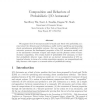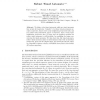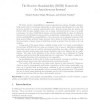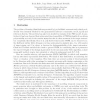346 search results - page 10 / 70 » Determinizing Asynchronous Automata |
158
Voted
CONCUR
1994
Springer
15 years 6 months ago
1994
Springer
We augment the I/O automaton model of Lynch and Tuttle with probability, as a step toward the ultimate goal of obtaining a useful tool for specifying and reasoning about asynchron...
85
Voted
CORR
2010
Springer
15 years 2 months ago
2010
Springer
Abstract. The extension of the Wagner hierarchy to blind counter automata accepting infinite words with a Muller acceptance condition is effective. We determine precisely this hier...
112
Voted
HYBRID
1997
Springer
15 years 6 months ago
1997
Springer
We de ne robust timed automata, which are timed automata that accept all trajectories \robustly": if a robust timed automaton accepts a trajectory, then it must accept neighbo...
157
Voted
IANDC
2007
15 years 2 months ago
2007
We define reactive simulatability for general asynchronous systems. Roughly, simulatability means that a real system implements an ideal system (specification) in a way that pre...
107
click to vote
ICGI
2010
Springer
15 years 1 months ago
2010
Springer
In this paper we extend the PAC learning algorithm due to Clark and Thollard for learning distributions generated by PDFA to automata whose transitions may take varying time length...




